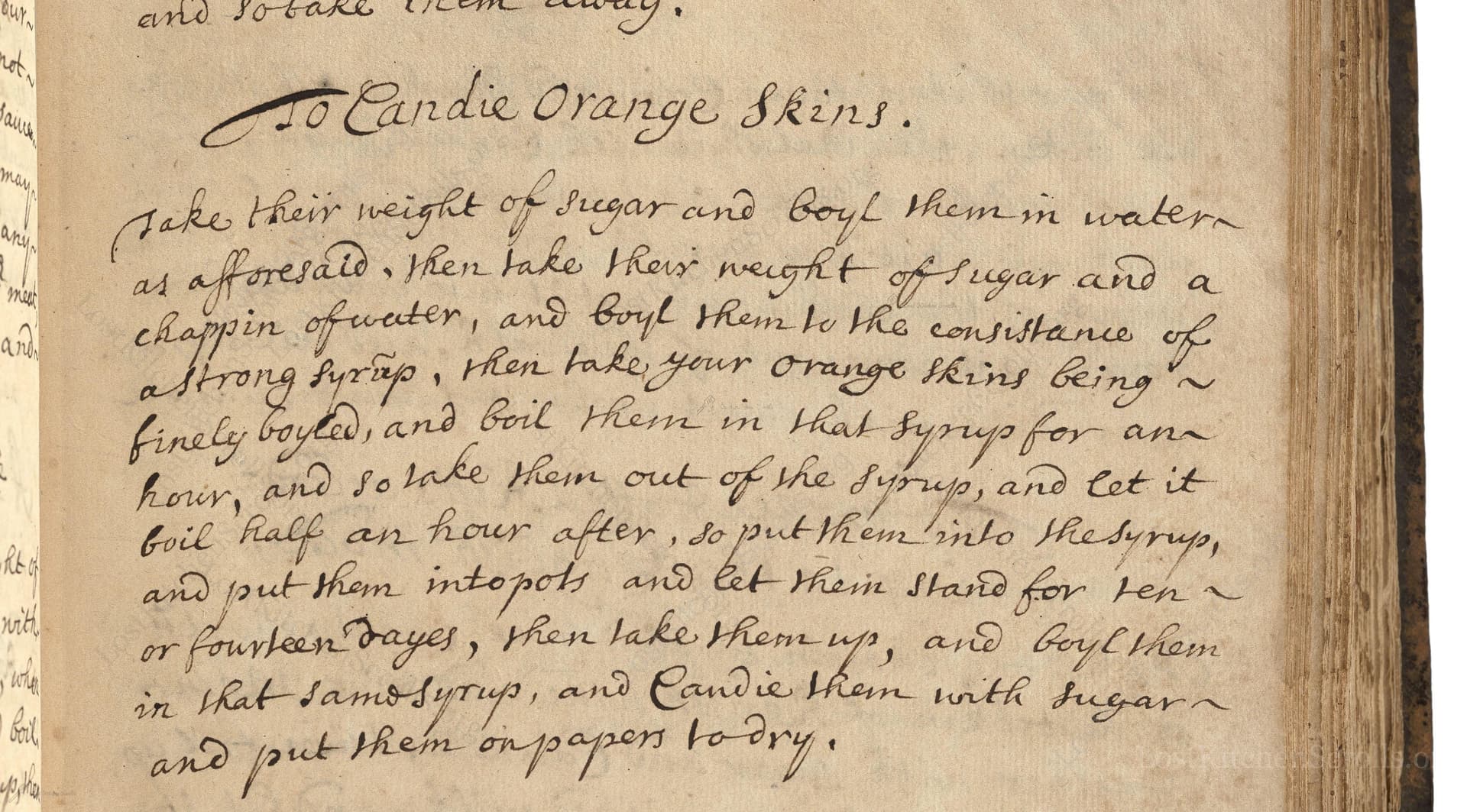To Candie Orange Skins
From the treasured pages of Cookbook
Unknown Author

To Candie Orange Skins
"Take their weight of Sugar and Boyl them in water as aforesaid, then take their weight of Sugar and a chappin of water, and boyl them to the consistance of a Strong Syrup, then take your Orange Skins being finely boyled, and boil them in that Syrup for an hour, and so take them out of the syrup, and let it boil half an hour after, so put them into the syrup, and put them into pots and let them stand for ten or fourteen dayes, then take them up, and boyl them in that same syrup, and Candie them with sugar and put them on papers to dry."
Note on the Original Text
The recipe is written in the casual, iterative style of the period—expecting the reader to have kitchen experience, an intuitive sense of timing, and no need for precise temperature or weight measurements beyond 'their weight'. Punctuation and spelling are fluid, as were conventions of the early 1700s; 'Boyl' for 'boil', 'chappin' for a Scottish liquid measure (about 600 ml), and 'candied' as 'Candie'. Directions blend ingredient preparation, cooking, and storage into one seamless narrative, requiring the modern cook to read through and interpret the process—making for a delightful kitchen challenge in translation!

Title
Cookbook (1706)
You can also click the book image above to peruse the original tome
Writer
Unknown
Era
1706
Publisher
Unknown
Background
Step back to the early 18th century with this charming culinary collection, brimming with period recipes that tantalize the tastebuds and offer a delicious glimpse into historic kitchens.
Kindly made available by
Folger Shakespeare Library
This recipe is a gem from the early 18th century, precisely dated around 1706, plucked from the manuscript collection 'W.a.111'. At this time, sugar was a prized and expensive commodity, reserved for special treats and medicinal preserves. Candied fruits like orange peels were delicacies enjoyed by the upper classes, often served at the dessert table or gifted during holidays and feasts. The lengthy, multi-stage process reflects both the value placed on such luxuries and the greater leisure time of well-to-do households. The recipe showcases the allure of exotic flavors—citrus fruits had been established in Britain by this period, but remained enticing and somewhat rare.

Cooks of the day would have used simple but sturdy equipment: brass or copper preserving pans for boiling the peels and making syrup, wooden spoons for stirring, and stoneware or earthenware pots for storing the syrup-covered peels during their ten-day rest. Strainers, ladles, and linen or plain papers would be used to drain and dry the finished candy. Fireplaces or hearths provided the heat, requiring both vigilance and skill.
Prep Time
20 mins
Cook Time
2 hrs 30 mins
Servings
20
We've done our best to adapt this historical recipe for modern kitchens, but some details may still need refinement. We warmly welcome feedback from fellow cooks and culinary historians — your insights support the entire community!
Ingredients
- Orange peels (weight as desired, e.g., 1 lb)
- Granulated sugar (twice the weight of peels, e.g., 2 lbs if using 1 lb peels)
- Water (for boiling and syrup, approximately 1 pint per 1 lb sugar, adjust as needed)
Instructions
- To make candied orange peels today, begin by weighing your orange peels after they've been boiled to remove bitterness.
- Measure out an equal weight of granulated sugar for the peels—for example, if you have 1 pound of peels, use 1 pound of sugar.
- Boil the peels in water first to soften them thoroughly.
- Prepare a strong syrup by dissolving another equal weight of sugar (1 lb) in 1 pint of water (about the equivalent of a Scottish "chappin") in a heavy-bottomed pan.
- Bring this syrup to a boil, then add your pre-boiled orange peels and simmer gently for one hour.
- Remove the peels from the syrup and allow the syrup to cook for an additional 30 minutes to thicken.
- Place the peels back in the syrup, then transfer both to a jar or container and allow them to mature and infuse for 10 to 14 days.
- Finally, strain the peels and simmer them once more in the same syrup until they are deeply infused and glossy.
- Lift them out, dredge them with more sugar, place them on baking parchment (modern equivalent of “papers”), and let them dry until fully candied.
Estimated Calories
100 per serving
Cooking Estimates
You will spend about 20 minutes getting your ingredients and workspace ready. Simmering the peels and syrup takes about 2 hours total. The peels then need about 2 weeks to mature before finishing, and another 30 minutes to cook and dry. This recipe makes about 20 servings, each with around 100 calories.
As noted above, we have made our best effort to translate and adapt this historical recipe for modern kitchens, taking into account ingredients nowadays, cooking techniques, measurements, and so on. However, historical recipes often contain assumptions that require interpretation.
We'd love for anyone to help improve these adaptations. Community contributions are highly welcome. If you have suggestions, corrections, or cooking tips based on your experience with this recipe, please share them below.
Join the Discussion
Rate This Recipe
Dietary Preference
Main Ingredients

Den Bockfisch In Einer Fleisch Suppen Zu Kochen
This recipe hails from a German manuscript cookbook compiled in 1696, a time whe...

Die Grieß Nudlen Zumachen
This recipe comes from a rather mysterious manuscript cookbook, penned anonymous...

Ein Boudain
This recipe comes from an anonymous German-language manuscript cookbook from 169...

Ein Gesaltzen Citroni
This recipe, dating from 1696, comes from an extensive anonymous German cookbook...
Browse our complete collection of time-honored recipes



